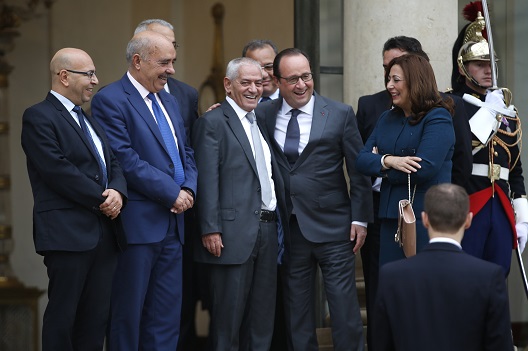 The Nobel Committee awarded the Tunisian National Dialogue Quartet the peace prize on October 9 for its role in navigating the country’s turbulent political transition. This date will always remain historic in Tunisia, a testament to the power of inclusive dialogue and the resilience of the Tunisian people and in a region characterized with chaos and violence. Nonetheless, Tunisia’s endemic social, political, and economic problems still pose a high risk to the country’s nascent democracy. One hopes that the Nobel Peace Prize can encourage Tunisians to advance transitional justice, which would drive the structural change needed to call it a true revolution.
The Nobel Committee awarded the Tunisian National Dialogue Quartet the peace prize on October 9 for its role in navigating the country’s turbulent political transition. This date will always remain historic in Tunisia, a testament to the power of inclusive dialogue and the resilience of the Tunisian people and in a region characterized with chaos and violence. Nonetheless, Tunisia’s endemic social, political, and economic problems still pose a high risk to the country’s nascent democracy. One hopes that the Nobel Peace Prize can encourage Tunisians to advance transitional justice, which would drive the structural change needed to call it a true revolution.
Tunisia had to struggle with deep ideological polarization that marked the post-revolution period to reach this point today, particularly during the 2012-2013 years of the Troika transitional government. As After the first democratically elected Islamist-dominated government took office in 2011, the resulting Islamist-secular polarization permeated all classes, sectors, and communities, with rifts estranging Tunisians over ideological differences—even within families. In those times, engaging in dialogue across the ideological divide took tremendous patience and effort. Those brave enough to do had to contend with an intense paranoia over identity politics.
During a meeting with one women’s rights defender in 2013, I explained my vision for a Women’s National Dialogue Initiative that I had hoped would add women’s voices to Tunisia’s political process. As I spoke on bridging the ideological divide, she interrupted me and said, “What do you mean? Do you want us to normalize the relation with the Islamists?” Her use of “normalization” echoed the tone and sentiment of the word when commonly used within Arab societies in the context of the complex and emotionally charged Israeli-Palestinian conflict. I realized that day the extent of the divide within Tunisian society.
Yet the fear of the Other often stems from stereotypes derived from historical baggage. During the twenty-three years of Zine El Abdine Ben Ali’s rule, the regime imposed its own opinion upon society as a whole, promoting homogeneity, secularism, and nationalism through the tightly controlled Tunisian media. The 2011 revolution highlighted the differences between Tunisians and many could not reconcile their carefully managed worldview with the abrupt seismic cultural change.
The news of receiving the Noble Peace Prize is a welcome refresher. Tunisia’s National Dialogue Quartet—composed of the Tunisian General Labor Union, Tunisian Human Rights League, Tunisian Order of Lawyers, and Tunisian Confederation of Industry, Trade, and Handicrafts (UTICA)—truly deserves this honor for helping to bridge the ideological gap. Beyond those institutions, the honor extends to Tunisians who supported the National Dialogue, the constitution-drafting process, and the subsequent technocratic government. Every Tunisian took personal responsibility for their country’s transition, directly contributing the national dialogue success.
However, the hard work has only just begun.
Besides the severely deteriorating economic and security environment, Tunisia’s politics suffers from ongoing turbulence, notably with regard to the lack of vision for transitional justice. As recently illustrated by the debate over the controversial economic reconciliation bill, new divisions between former regime loyalists and revolution advocates have emerged. If the eventual outcome of the National Dialogue were a consensus between major political parties and a weak parliamentary opposition to a new bill for economic reconciliation, it would effectively annul the Truth and Dignity Commission’s transitional justice process and result in amnesty for corrupt officials and business owners with close ties to the former Ben Ali regime.
The spirit of the Nobel Peace Prize certainly would not endorse such a move. Tunisian citizens reserve the right to reveal the truth and to protect their collective memory. Advancing transitional justice will lay the foundation for a sustainable peace. Today, the tendency to romanticize Tunisia’s story threatens to overlook a past with which its citizens must still reconcile. In these times of celebrations, we should remain conscious that Tunisia has not yet overcome its challenges. Sustainable peace also means creating economic opportunities for youth, strengthening our institutions, modernizing public administration, reforming the security sector, protecting minority’s rights, and reinforcing societal cohesion.
Let October 9 mark a new beginning for Tunisians to embrace its diversity, understand its past, and build its future.
Ikram Ben Said is Fulbright Fellow at the Humphrey School of Public Policies and Public Administration at University of Minnesota. She is also the founder and President of the Tunisian NGO Aswat Nisaa (Voices of Women).
Image: French President Francois Hollande poses with Tunisia's National Dialogue Quartet representatives at the Elysee Palace in Paris, France, October 16, 2015. Tunisia's National Dialogue Quartet won the Nobel Peace Prize for helping build democracy in the birthplace of the Arab Spring. (L-R) Tunisian lawyer Fadhel Mahfoudh, Abdessatar Ben Moussa, Head of Tunisian Human Rights League (LTDH), Hussein Abassi, head of the Tunisian General Labour Union (UGTT), French President Hollande, and Wided Bouchamaoui, president of Tunisian Confederation of Industry. (Reuters)
